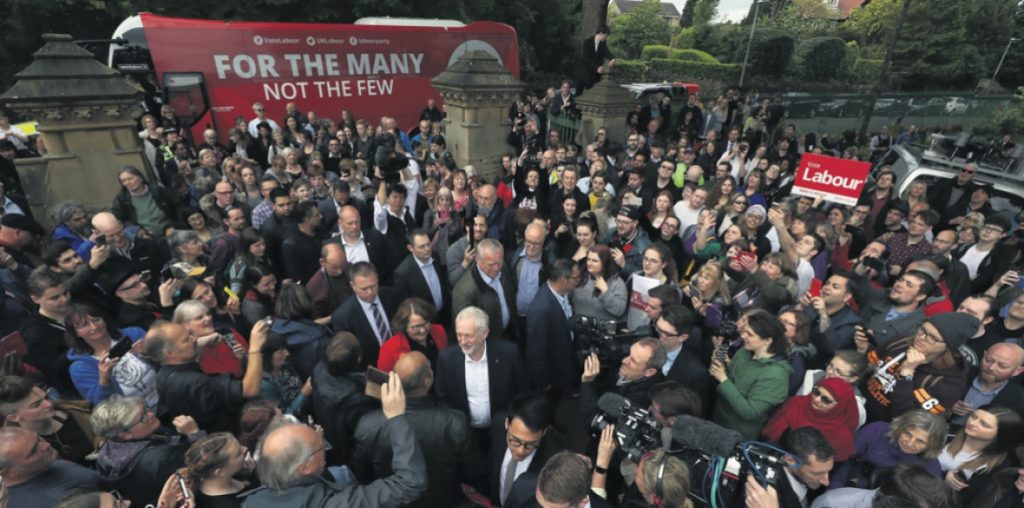
Morning Star, with Mike Phipps

Nearly three years since Jeremy Corbyn became Labour leader, his standing has drastically changed.
His opponents in the parliamentary party are a lot quieter. The Labour Party apparatus is at last being reshaped to match the new reality. Recent polls indicate Labour has a real chance of winning a general election.
Today millions of people are invested in the idea of a Jeremy Corbyn-led Labour government. That raises a new challenge — how to maintain and strengthen the unity of the diverse forces that got us this far.
Trade unions, social movements and thousands of new enthusiasts are working for this unprecedented opportunity, but, as we get nearer to power, every aspect of Labour’s policy will be subjected to fierce scrutiny by our opponents.
Already in recent days, the Tories have tried to attack Corbyn over national security.
He is right to warn not to rush ahead of the evidence and John McDonnell to note that Vladimir Putin has questions to answer.
We need no lessons in patriotism from a government that has done such damage to Britain’s infrastructure and caused such hardship to its people, but we must be aware that they will be looking for weaknesses on every front. So what do we need to do?
First, we must strengthen our policies. There were several contradictions in the 2017 manifesto, not least the commitment to maintain Trident, which need fixing.
We also need to develop policy in new areas so we have something to say on every feature of national life and global politics.
Second, we need to transform Labour into a movement that can not only gain power but carry through its programme.
This also means strengthening the social movements that have provided the backbone of opposition to this government and from which Corbyn’s leadership draws its strength.
Maintaining the unity of the forces invested in a Corbyn victory, which may yet be a while away, is no small task. In recent weeks, tension has emerged over the contest as to who will be Labour’s next general secretary. Writing in The Guardian, Owen Jones saw the candidacy of Jon Lansman, the national chair of Momentum, who has since withdrawn, against that of Unite’s Jennie Formby as “a sign of just how hegemonic the party’s left has become.”
He saw the rivalry as “a mark of the left’s sense of political security.”
Martin Kettle in the same newspaper was more sulphurous. He called it a “debacle” that exposed to public view “real and potentially fundamental divisions.” Who’s right?
The truth may lie closer to Jones’s view. There is undoubtedly a tension between the 30,000-plus members Momentum has recruited, arguably the most active section of the hugely increased Labour membership, and the older trade union left.
Momentum mobilised on an unprecedented scale in the 2017 general election. Its My Nearest Marginal app was used by over 100,000 people.
Momentum contacted over 400,000 voters on polling day through viral WhatsApp messaging.
During the campaign, nearly one in four UK Facebook users viewed a Momentum video.
Unsurprisingly, its members are impatient for change and frustrated with the slow pace of internal party reform.
Many are unengaged by the old methods of doing politics in the party and want to see palpable changes that transform it into a mass campaigning movement.
That said, there is an absence of detail on exactly how. It may well be that some concrete ideas could be a basis for unity across the divides.
Leading left unions are both engaged by and a little wary of this new movement, which is youthful and enthusiastic, certainly, but also politically inexperienced.
Unite and others stayed with the party through its leanest years, funding it in elections once New Labour’s fickle donors deserted the party.
In opposition during the coalition years, they pushed for better, more accountable candidates than those wanted by the party apparatus, used to parachuting their own favourites into winnable constituencies, often in the teeth of opposition from local activists.
In the process, they had to confront both the party’s right wing and a hostile mainstream media.
Those who understand the party’s history must communicate that Corbyn is neither the property of Momentum alone, nor of the left unions, nor of the old Labour left, nor even of the broader membership.
There are millions now, both inside the party and out, who passionately want a Labour government. They will rightly take a dim view of any disunity which could jeopardise that.
It’s worth remembering too that there are still plenty in the party, especially among its parliamentarians, who still don’t want Corbyn as leader, even if his strong showing in last year’s election has temporarily silenced them.
They will seize on any sign of weakness — either within the Corbyn-supporting unions or the broader membership — to roll back the astonishing achievements of the last two years and prepare another leadership challenge.
We on the left must continue to work together with discipline, mutual understanding and a focus on the main prize.

Liz Davies is a Labour Party activist and housing rights barrister. Member of Southampton Test CLP and Unite the Union. Previously secretary for Hackney North CLP (2017–2018). Co-author Housing Allocation and Homelessness law and practice (Luba, Davies, Johnston and Buchanan, 2018, LexisNexis) and Honorary Vice-President of the Haldane Society of Socialist Lawyers. Her professional profile is here. She cannot respond to queries about legal cases through this website.
Read full bio